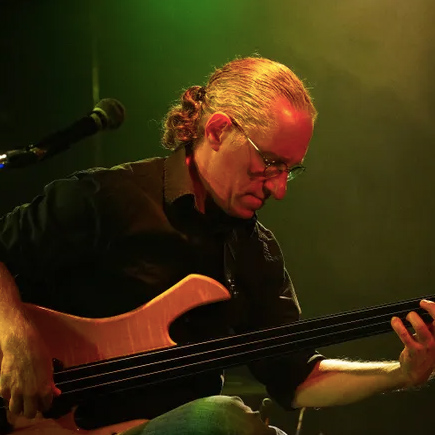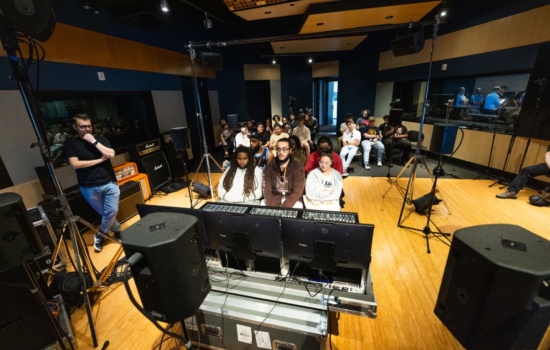Bassist
Career Overview
Bassists provide the harmonic underpinning and supply a rhythmic groove to music by a band or ensemble.
Alternate Titles
Bass Player
Salary Range
$40K-$60K

How To Become a Bassist
People also ask
Career Description
Bassists play the lowest notes in the music, usually in a percussive style, to flesh out the sound while laying down the foundation of the harmony and rhythm. Bassists, or Bass Players, play melodic figures and patterns that are often a recognizable part of a song or piece of music. The function of the bass instrument is to provide the harmonic underpinning and supply a rhythmic groove, or “feel” to the music. The bass is also a melody instrument.
Many Bassists play an electric bass guitar with 4, 5, or 6 strings, especially in contemporary and popular music styles and groups. Other Bassists play the upright bass, also called a contrabass or double bass, which is an acoustic instrument and the largest of the violin family. The upright bass can also be called an acoustic bass, and has a fretless fingerboard, but there are some acoustic basses that look more like acoustic guitars and have frets.
Electric bass guitars can be fretted or fretless. They can be plucked with the fingers, with a plectrum (pick), slapped and popped with thumb and forefinger, or in the case of the upright bass, bowed. Some Bass Players also perform on keyboard instruments, and bass synthesizers are often used in popular music. There are also bass pedal instruments, such as the Hammond organ or Moog Taurus synthesizer.
If the drum set provides the heartbeat for the band, the bass could be considered the veins and blood that connect the beat to the body of the music. Bass has also been called the glue that holds everything together. Indeed, the Bassist provides a sonic link between the harmonic, rhythmic, and melodic elements of any group or music.
The Bassist might be the member of the band least noticed by the public; however, they perform a crucial role. Together with the drums, the Bassist creates the backbone of a band’s sound. The Bass Player and Drummer are sometimes collectively called the rhythm section. Their goal is to play grounding and constant rhythms and variations together, to support the other musicians and make the audience tap their feet, nod their heads, and dance to the beat.
Bassists work in just about all styles of music, which keeps them in demand. Almost all bands, ensembles, and orchestras include a Bassist, from small combos to symphony orchestras. While the role of Bassist doesn’t usually come with a lot of glory and fame, the best Bass Players keep exceedingly busy with sessions, gigs, tours, concerts, and shows.
Even if the public doesn’t fully appreciate the role, musicians all know how important it is to have a solid Bassist in the group. A good Bassist gets a lot of respect from the other musicians in a group, and almost every group needs a good Bassist.
To learn more about the experience of becoming a professional Bassist, we talked to Michael Manring. He’s a solo artist, has worked as the House Bassist for Windham Hill Records, and with the band Montreux.
What does a Bassist do in a band?
While there certainly is an established conventional style that Bassists tend to use in contemporary music, I have to beg to offer the unfashionable perspective that I think it’s a mistake to take this notion as exclusive. It is, of course, wise, if not essential, for anyone who wants to be a professional Bassist to have a mastery over the kind of playing that has been historically predominant, but music is a creative art form and an attempt to limit the huge range of expressive potential in the instrument to any one idiom is, in my opinion, counterproductive and even unprofessional.
I can only offer my own perspective, but as a working Session Bassist who has been hired by hundreds of artists over a 40+ year career, I can tell you that I am often asked to play in ways that are far off the beaten track. Just recently, in fact, I was asked to provide 9 different, complete bass parts to a single piece of music, 3 conventional, and the other 6 ranging from somewhat unusual to downright bizarre. All were used in the final product. I’m a bit more expensive than your garden variety Session Bassist and I believe this is why folks are willing to pay a little more for my services–they know I will give them the very best straight-forward bass part I can manage, and also provide them with other options if they’re interested. I encourage my students to be as complete musicians as they can.
Are bass players failed guitarists?
Absolutely not. Many of the most famous and most talented bass players didn’t start by playing the guitar, they started on bass. Although guitars and bass guitars have many similarities, they play different roles in a song, sound different, and require different playing techniques. Saying that bass players are failed guitarists is insinuating that bass is easier to play than guitar, which is not true.
Salary
Good Bassists work a lot, and the best Bassist are in very high demand for live performances and recording sessions. Since most Bassists work as freelancers, they get to decide what they are worth, keeping in mind what the market will bear. Most Bassists are paid on a fee-only basis depending on the gigs they do.
They could be paid for one gig or a session, for a series of gigs, a tour, or a number of sessions. They could work in a theater pit band, an orchestra, a rock band, a dance band, or on tour with a major artist. The more gigs there are, and the higher profile of those gigs, the more money there is to be earned.
The American Federation of Musicians (AFM), also called the Musicians’ Union, sets rates for sessions and gigs based on a per-session and hourly rates. These are commonly called union scale rates. For example, the 3-hour session for a side musician rate is $450.00 with $300.00 as the 1.5 hour “Special session” rate. Overtime is calculated at 1/3 of the above rate per each half hour. The Screen Actors Guild – American Federation of Television and Radio Artists (SAG-AFTRA) is another labor union that sets pay rates for musicians.
Union scale also provides for increases in pay rates for doubling (playing more than one instrument on a session or gig) and for leading sessions. There are other rates calculated, such as for overdubbing previously recorded parts. There are also separate rate scales for recording demos, for playing on jingles (advertisements), and for contracting musicians for sessions and gigs.
It can get a bit complicated to figure out what musicians should be paid under union scale so many people work around it by making their own agreements and contracts. Some jobs pay way above scale, and some pay less. It’s also possible to get paid royalties on some recordings.
The freelance nature of working as a musician makes it difficult to calculate an annual salary for full-time Bassists. Many musicians work part-time and have a day job, too. Most professional musicians do some teaching, and this includes Bassists. It’s also easier to find work in a major urban center where there are more opportunities that pay well.
The Bassist starting out could make $50-100 on their first gigs, and that’s as far as some people ever get. Moving up to union scale, they might earn between $40,000-$60,000 annually, working full time. There are Bassist working with major artists who earn $10,000-$20,000 per gig, but they may not be out on tour or doing concerts year-round.
Bassists who are music directors or bandleaders can earn more, and singing could also be seen as a huge plus. There have been some high-profile artists who sing lead and are also Bassists, such as Sting (The Police), Phil Lynott (Thin Lizzie), Paul McCartney (The Beatles), and others. There are many musicians who have become quite wealthy as Bass Players.
The bottom line is that there is certainly a great living to be had for the successful Bassist, but it is likely to take some time and top-notch skills and talent to get to that point.
How do Bass Players make money?
The main avenues for generating income in music are composing, performing, recording, and teaching. Recently we’ve seen a form of web-based neo-patronage emerging, as well. That may become the most significant revenue source for musicians as the more conventional ones become obsolete.
Hey, what do you think about trying our new Music Career HelperMusic Career Helper really quick? It’s totally free and could help get your career moving fast! Give it a try. It’s totally free and you have nothing to lose.
Career Outlook
It is rare to find a performing band without a Bass Player, and there is always high demand for good Bassists. The bass is a critical part of the band, due to its function and role as the foundation of the harmony and rhythm. For the musician who wants to work a lot, choosing the bass is a wise decision.
Although the Covid-19 Pandemic temporarily stopped all demand for concerts and live music, the industry has been coming back with a roar. There is a huge pent-up demand for live music, and this is reflected in how quickly concerts are selling out. People need musical entertainment, and live music isn’t about to disappear anytime soon, pandemic or not.
There is also a steady increase in all revenues from music, and the music industry is projected to grow rapidly for the foreseeable future. Not only are revenues from live music increasing, but also from music in films, TV, radio, advertising, video games, theme parks, cruise lines, and mixed media. Bassists and professional musicians can find work from many sources.
Starting out in any industry, and especially the performing arts, is never easy, but Bassists have a certain edge. Since the need is strong, they can count on being employed if they can develop the necessary skills, work hard at it, network with others in the music industry, and manage to be in the right place at the right time. This might mean attending a music college or relocating to a large city. As with any career, it helps to have a share of good luck.
To enjoy a fabulous career as a Bassist, be prepared to study, practice a lot, learn different styles of music, and hustle. This is what the successful pros do.
How long does it take to become a Bassist?
As with most complex activities, basic proficiency can be acquired in a few years, but even a lifetime isn’t enough to master the whole constellation of skills involved in making music. The more time you put into it the more you can accomplish, so it just depends on your goals.
What is the difference between bassist and guitarist?
First, most guitars have six strings with a standard tuning of EADGBE while most basses have four strings with a standard tuning of EADG and are in a lower octave. Second, guitarists play chords, riffs, and solos while bassists are part of the rhythm section, usually playing one or two notes at a time and staying in sync with the kick drum.
Career Path
Most musicians start playing early, while in school. Interestingly, many Bassists started out playing other instruments. Since bass isn’t a glamorous instrument to most, young people tend to gravitate to flashier instruments like guitar or trumpet. Once they start playing in groups they become aware of the importance of the bass.
There are many stories of Guitar Players in a rock band switching to bass, because they couldn’t find a good Bassist for their band. It’s also relatively easy for Guitar Players to pick up the bass since the fretboard technique is very similar to the guitar. Some Bassists start out playing the tuba or euphonium, which are brass instruments that play in the same register as a bass.
Many Music Teachers learn to play bass too, so they can support their ensembles when no Bass Player is available. There always seems to be a shortage of Bassists, so switching to bass can give young musicians more performing opportunities than they otherwise would have. For those that do pick up the instrument and fall in love with it, playing the bass becomes a lifelong obsession.
Getting in a successful band is one way to reach for the stars, but to have a sustainable career over the long term requires plenty of practice and study. Beginning Bassists can take private lessons and so can those with more experience. Even professional musicians will sometimes study privately with a master of their instrument. This can be done in or out of school.
Attending a conservatory or a music college or university program is another way Bassists launch their careers. Aside from the training in all facets of music, such as performing, writing, producing, arranging, music theory, music history, conducting, and other subjects, the right school can offer important career networking opportunities, with both the faculty and other students. The best schools also have active ensemble programs where a Bassist can gain experience playing in all types of music groups and styles.
When school finishes, the hard work really begins. Not only is it crucial to continue learning, but finding work becomes of utmost importance. Moving to a large urban hub where there is a music industry and plenty of musicians will up the ante in terms of gaining the competitive edge. Being surrounded by lots of great players chasing many opportunities is a way to really hone skills and find out what it takes to survive as a professional musician.
Performing live is the way to be seen by others who might approach or recommend you for more paying gigs and sessions. Getting on records is also important, as you will need materials to build a professional portfolio of work. It’s also a good idea to work on expanding your repertoire by constantly learning to play new material.
Having other skills such as directing, arranging, or producing music can also lead to better opportunities, as can working in some part of the music industry. Starting out working at a label, booking agency, or a Music Publisher could really help you make the connections you’ll need to get to the next level.
Regardless of talent level, the aspiring pro Bassist should be ready to put in a sustained effort with practicing, playing, networking, and chasing down the best opportunities. At this level, where one starts isn’t nearly as important as where one ends up. With persistence and a little luck, the talented hard-working Bassist will ascend to the top stages and studios.
How do you become a professional Bassist?
Many musicians start by making music with their friends and building from there. A band with a strong local following is a standard pathway to bigger things. Nowadays, however, there are online worlds to be explored and developed, and many of the old rules no longer apply. The trick is to develop your skills, then get yourself out there by whatever means you have available to you. It’s probably wise to be flexible, adaptable, and ready to take on all kinds of challenges.
Experience & Skills
First and foremost, a Bass Player must understand the vital functions their instrument performs in a band or group. They must be able to create a rhythmic foundation for the band while underpinning the harmony at the bottom of the tonality. This means providing a strong pulse with a steady rhythm, while also choosing the right notes to provide the foundation of the harmony.
Most Bassists, but not all, are strong readers of music. They can read single notes in bass clef and their music theory knowledge allows them to understand the notes indicated by chord symbols. They should be able to improvise a fitting bass part based on only chord symbols on the page or knowledge of a chord progression. This means understanding harmony and how different styles of music are put together. It’s also helpful for Bassists to read music in treble clef since they might be asked to transpose a melody from the treble clef to bass register.
The Drummer also has a responsibility to create the pulse in the music, and they do this by locking in with the bass in a groove or rhythmic pattern that makes people tap their foot, bob their head, and dance. Bassists and Drummers are expected to work together to build the groove (feel) in the song, so a good Bassist also understands and appreciates how the drum part works together with the bass part. It’s important for each member of a group to have a good rhythmic feel when playing together as a unit.
Bassists also influence the dynamics in a piece of music. By playing louder or softer they can control the sound levels of the ensemble. Occasionally the bass could be called on to play chords, or double-stops (two notes at the same time). Bass can even play melodies. The bass influences how we hear harmonies; we tend to hear all notes relative to the lowest sounding pitch, or the bass note. A good rhythmic foundation and harmonic awareness are what Bassists need to get the job done. Being able to play with a click-track is also a useful skill.
The best way to get experience playing bass is by playing in bands or groups. Starting out in school groups, perhaps, or with local musicians at a jam session, and then working up to better playing situations such as high-profile concert and session work, the aspiring Bassist can build a resume and portfolio of recordings. It’s essential to have these recordings to show others what you can do. Having a knack for self-promotion will help accelerate your career. You will need to toot your own (bass) horn, so to speak.
It takes a long time to build up a great reputation, and a short time to ruin it. Always being on time and well-prepared is super-important. In fact, you should strive to always be the best-prepared person there. Always arrive early. Musicians, Producers, and bandleaders notice and really appreciate those qualities in a Bassist. Being confident in your playing and always doing what’s best for the music, without showing off, are also admirable qualities that put one on the A-list of Session Players.
Bassists can also build solo careers, and they can do this even while a member of other groups. Most of the world’s best Bass Players have put out albums under their own name, and even toured as headliners. There’s room for multiple leading voices in every genre of music, and there’s nothing to stop Bassists from stepping forward into the spotlight and stardom.
What makes someone a good Bass Player?
A good Bassist has the same skills as any other good musician: great ears, a strong rhythmic sense, an ability to work well in a group, a broad understanding of all kinds of musical ideas, creativity, a positive attitude, and a desire to learn and improve.
Is bass guitar easier than guitar?
To a beginner bassist, playing bass may seem easier than playing guitar, mainly because bassists usually play just one or two notes at a time. But bass guitar is not easier than guitar, especially when you start to understand the role of the bass. Plus, bass guitars are heavier than guitars, have a longer and wider neck, and the strings are thicker and require stronger fingers.
Education & Training
Starting out with private lessons is very usual for a would-be Bassist. The beginning Bassist can also practice by playing along with recordings and imitating the sounds on the records. Learning some basic repertoire and then joining with a band as soon as possible should be a part of the early Bassist’s training. Most Bassists are playing in jazz or rock groups by the time they get to high school. Self-study using books, recordings, and online videos and resources is also quite common.
There are many options for Bassists to attend music college, whether they play the electric bass, the upright, or both. Conservatories, colleges, and universities all have ensembles, bands, and orchestras that require Bass Players. Some colleges, like Berklee College of Music in Boston, even have a Bass Department with numerous faculty members teaching lessons, labs, and classes in different styles of music. It’s possible to graduate with a bachelor’s degree, a master’s, or even a doctorate with the bass as principal instrument.
A student Bassist could major in performance, composition, music education, or other areas like music business, songwriting, music production, or even music therapy. Some Bassists become well known as performers, Teachers, Arrangers, Producers, Songwriters, and Composers. Not all Bassists choose to attend college, and some who do might major in a subject besides music, but most successful Bassists have had some formal music training, lessons, and have studied many areas of musicianship along the way.
Students in music college study not only their instrument, learning to read and improvise on the bass, but also study ear-training (solfege), music notation, harmony (music theory), music history, conducting, traditional counterpoint, music technology, and take electives and liberal arts courses to earn their degree.
Students in a four-year undergraduate music program also take a minor. The minor allows them to focus on a secondary area in addition to the major. Most minors consist of between 3-5 additional courses and combine with the major in the core concentrate area. For example, a Songwriter might take a minor in poetry, or a music business major might take a minor in show/concert production.
College Bassists will play and perform in a variety of labs, ensembles, and groups on their instrument. Ensembles combine groups of instruments and often perform, while bass labs are comprised of small groups of Bassists only, focusing on some aspect of instrumental performance, such as reading, improvising, recording, learning to play with a rhythm section, or playing certain musical styles.
Students gain more from a college or university than just the instruction and coursework. A big advantage of music school is meeting lots of other young, talented, and motivated students who will become part of a future professional network. One way to meet other like-minded people is in student clubs, usually supported by the Department of Student Activities. Faculty also become an important network, often leading to work opportunities.
If offered, participation in other kinds of extra-curricular activities, from sports to concerts or workshops, provide additional benefits such as wellness and fitness, or learning a specific aspect of tradecraft related or unrelated to the music industry. Students also get useful career advice for launching a career.
The skills needed to do the job aren’t the same as the skills needed to get the job, so work on these skills separately. This means learning to present yourself appropriately, whether through your materials (e.g., resume, cover letter, artist bio, portfolio) or in person. Time spent working on your career skills while in school is time well-spent. It’s all a part of becoming the well-rounded Bassist and musician you want to be.
Sources

Michael Manring
Hailed by many as the world’s leading Solo Bassist, Michael Manring has been pushing back the boundaries of what’s possible on the bass guitar for over three decades. While his technical skill and innovations always make an impression, it is his ability to communicate on a profound emotional level that most touches listeners. As Editor Tom Darter wrote in Keyboard magazine after seeing one of Michael’s solo concerts, “Forget his astounding technique and musicality; forget his absolute command of his instruments; forget how seamlessly the musical ideas and the performance of them were wedded together…The enlightenment came most from feeling (seeing, hearing) the joy Michael felt to be playing…his brand of transcendental chops and musical understanding…was all in the service of the final outcome, the joy of making music.”
Building on the conceptions of his teacher, the late bass legend Jaco Pastorius, Michael has developed a new approach to the instrument that includes unorthodox tunings, techniques, and methodologies. He has honed his skills on hundreds of recordings as a Session Musician and thousands of concerts throughout the world in venues including Carnegie Hall in NY, Yamaha Hall in Tokyo, and Davies Symphony Hall in San Francisco. Michael has worked with a surprisingly diverse collection of musicians from New Age Keyboardist Suzanne Ciani to avant-improv guitar innovator Henry Kaiser to celebrated folk troubadour John Gorka to experimental post-metal rockers Tim Alexander (Primus) and Alex Skolnick (Testament) to electro-pop pioneer Thomas Dolby. His long-term collaboration and close friendship with the late acoustic guitar genius Michael Hedges led to a lengthy stint as House Bassist for Windham Hill Records; a label for whom he also worked as a solo artist, releasing four recordings under his own name: Unusual Weather (1986), Toward the Center of the Night (1989), Drastic Measures (1991) and Thonk (1994). These, along with his 1998 release The Book of Flame on the Alchemy record label earned him an international reputation as “a master of the fretless bass without rival.” (Guitar Club Magazine, Italy). He has garnered two gold records, Grammy and Bammie nominations, a Berklee School of Music Distinguished Alumni Award, two Just Plain Folks Awards, and numerous Bass Player Magazine Reader’s Poll awards including 1994 Bassist of the Year. He was also the subject of a PBS TV documentary, The Artist’s Profile: Michael Manring and a Youtube video of him playing his iconic solo piece “Selene” has well over a million views.
In his solo concerts, Michael weaves together his musical influences into a tapestry rich with expression, virtuosity, humor, and meaning. As one Writer put it, “Michael Manring can do more with a bass than even the most creative individual could imagine” (L. Pierce Carson, Napa Valley Register). His newest release Soliloquy, performed entirely solo without overdubs, is the best recorded example yet of that depth and diversity. Using a variety of bass guitars and the far-reaching, innovative approaches he is renowned for, with Enhanced CD content including Michael’s extensive 24-page liner notes detailing the composing and recording process, photos, and live performance videos, Soliloquy takes the listener on a unique musical journey. We hope you’ll follow the advice of France’s Musicien magazine: “Do not miss your next opportunity to discover the Bassist with the most fresh and inventive playing today.”






















